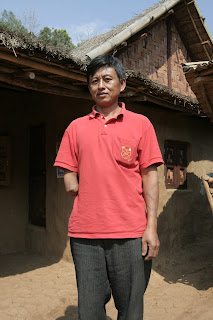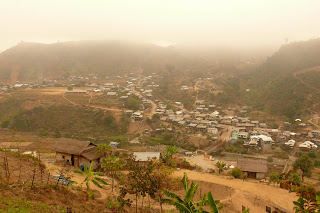An Interview with Dr. Ulrich Hulhne of Germany, at the Mae Tao clinic on the Thai-Burma border. Hulhne worked at Mae Tao as an acupuncture instructor.
How many patients do you have?
About 30 in a day. 600, 700 patients in a month.
What's your background?
I'm a GP. That's does everything and knows nothing. My medical studies were in Colombo in Sri Lanka. I came to know a Sri Lankan professor of rheumatology, that was when I was 44 years old. And I said 'I would have liked to do medicine, but now it's too late.' And he said 'why? You are young enough and dynamic enough. I'll help you to get in.' So I went to Colombo to do my studies. I finished the studies and became an MD, only for the Commonwealth. I'm not supposed to treat in Germany.
In between I went to China for 9 months and studied acupuncture because this professor had been sent by his government to China very much earlier to find if acupuncture would be a good alternative for a third world country like Sri Lanka. And it was. And he said 'you should go to help me se this up.'
Is it more common in Sri Lanka now?
Absolutely. See, you don't need any medicines. It doesn't have any side effects and the way of treatment is in many ways much more successful.
How does it work better than Western medicines?
You know that is a question which is not solved until now, though Western scientists as well as Chinese scientists are trying to find out why acupuncture works. And they can't come to any conclusion. The fact is that it works, and the Chinese have developed that over 4,000 years. So it is not something that can be cracked.
Can acupuncture be used to treat the pain around the wound of an amputee?
Yes, even phantom pain. We can treat that and cure that phantom pain. And we can also anaesthetize for big operations. See, I have written a book called Acupuncture. This was taken in a hospital in Colombo, during a hysterectomy in Colombo. See, she is fully aware of what is happening, she is drinking and she is talking to the nurse. There is no pain during or after the operation.
Is there any trial and error?
There are 10 per cent of all patients who do not respond to acupuncture, and you do not know before who. We treat patients and we do not realize until after three or four days there is no reaction. We tell the patients we are sorry, you are one of these ten per cent and we cannot help you. See that is another open question, nobody knows why it doesn't work.
When you came to the Mae Tao Clinic three months ago what was the state of the acupuncture clinic?
It was down more or less to zero. There was a lady from that organization, there, see it? North American—something. She was here only for short periods and she was teaching the basics of traditional Chinese medicine, and some that she was teaching were absorbed in the clinic later. For example here in the surgery. When I came here and saw that only one gave acupuncture I thought that this would be a good opportunity to build up an acupuncture board. We had a gathering of all those who were trained and I said 'would you like that we continue that?' And so there were eight fellows, two girls, six boys, and I was teaching them in the afternoons and in the mornings we started treating. We started with two or three patients a day, and now you see there are 30.
Is it a very precise practice?
There are very precise points. Every point is identified, and they have to learn that. I have taught them about 350. Now, see how we do it. This is the name of a patient that we treat, and we compose a so-called cocktail of points. These are the abbreviations which everybody here should understand. This is the DU channel. This is the urinary-bladder channel. This is extra points, stomach channel, gall bladder channel and lung channel and the numbers. So if I write this cocktail they have to know where to find these points.
Do patients ever protest against the pain?
No, there is no pain. If you sit here and watch for a while you will see. You saw how thin the needles were.
How far in do they go?
It depends on the point were you put it. For instance the point on sciatica. You put it in the buttocks, and the point there is this deep about (he holds his fingers about six inches apart) to the sciatic nerve. See these are the longest needles. They go right in.
Can you buy these needles here in Mae Sot?
In Mae Sot nobody knows about acupuncture. I went to a pharmacy at the beginning and asked 'do you have needles?' He said 'needles? For what?' I said 'acupuncture.' He said 'acu-what?' He's never heard anything. So we see that we get donations. I get them through donations.
The first set through that organization, but they stopped supplying us, so the next lot I got from an Italian organization because they have an NGO here. And we treated a lady from this NGO for migraine. You know what migraine is? The most terrible headache that you can imagine. This woman, this young lady had one attack every week. And when she had it for two days after she could not work. Be it for the side effects of the terrible pain killers she had to take, the highest doses and the strongest doses you can imagine for migraine. Paracetamol and such nonsense does not help.
And she came here and she turned 'round and she said 'I feel vomitious.' And I said 'better do that outside. And she came in and we gave her the needles and after five minutes she fainted. That was needle shock. We have that off and on. Especially when patients get the first time needles and we give three or four needles. The average they get is 15 needles.
She laid down for five minutes and she got up and said 'miracle, my headaches have gone.' Totally gone after five minutes of treatment. So she said 'I will go back to office and if I can continue working I will phone you.' Because normally after an attack she goes home. And she phoned me from the office and said she's so well she does not have to go home. And that was since the beginning of February and in that time she has not any attack. So the boss was so happy that he donated us 15,000 needles. This is how we replenish our needles.
Do you have any desire to go into Rangoon or work within Burma legally?
No, here I can work much better, much more.














